Mises, Ludwig von. Theory and History: An Interpretation of Social and Economic Evolution
Подождите немного. Документ загружается.

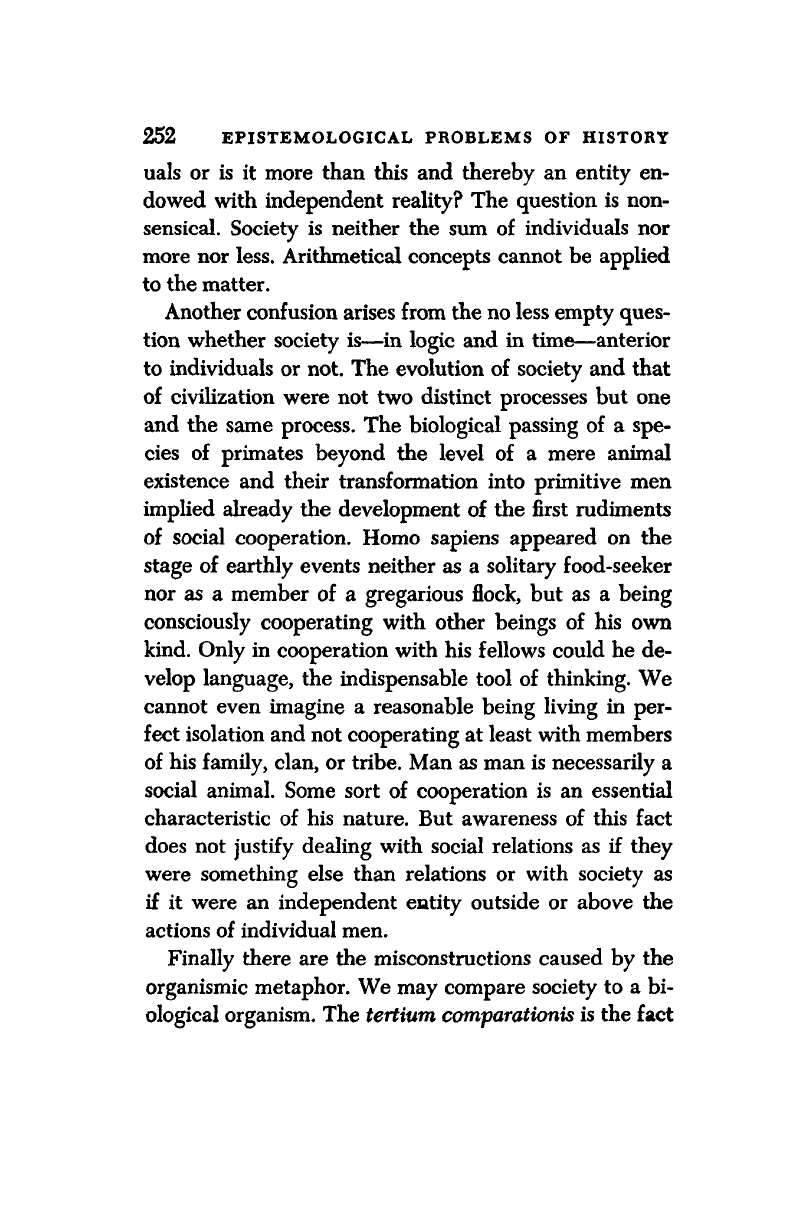
252 EPISTEMOLOGICAL PROBLEMS OF HISTORY
uals or is it more than this and thereby an entity en-
dowed with independent reality? The question is non-
sensical. Society is neither the sum of individuals nor
more nor less. Arithmetical concepts cannot be applied
to the matter.
Another confusion arises from the no less empty ques-
tion whether society is—in logic and in time—anterior
to individuals or not. The evolution of society and that
of civilization were not two distinct processes but one
and the same process. The biological passing of a spe-
cies of primates beyond the level of a mere animal
existence and their transformation into primitive men
implied already the development of the first rudiments
of social cooperation. Homo sapiens appeared on the
stage of earthly events neither as a solitary food-seeker
nor as a member of a gregarious flock, but as a being
consciously cooperating with other beings of his own
kind. Only in cooperation with his fellows could he de-
velop language, the indispensable tool of thinking. We
cannot even imagine a reasonable being living in per-
fect isolation and not cooperating at least with members
of his family, clan, or tribe. Man as man is necessarily a
social animal. Some sort of cooperation is an essential
characteristic of his nature. But awareness of this fact
does not justify dealing with social relations as if they
were something else than relations or with society as
if it were an independent entity outside or above the
actions of individual men.
Finally there are the misconstructions caused by the
organismic metaphor. We may compare society to a bi-
ological organism. The tertium comparationis is the fact
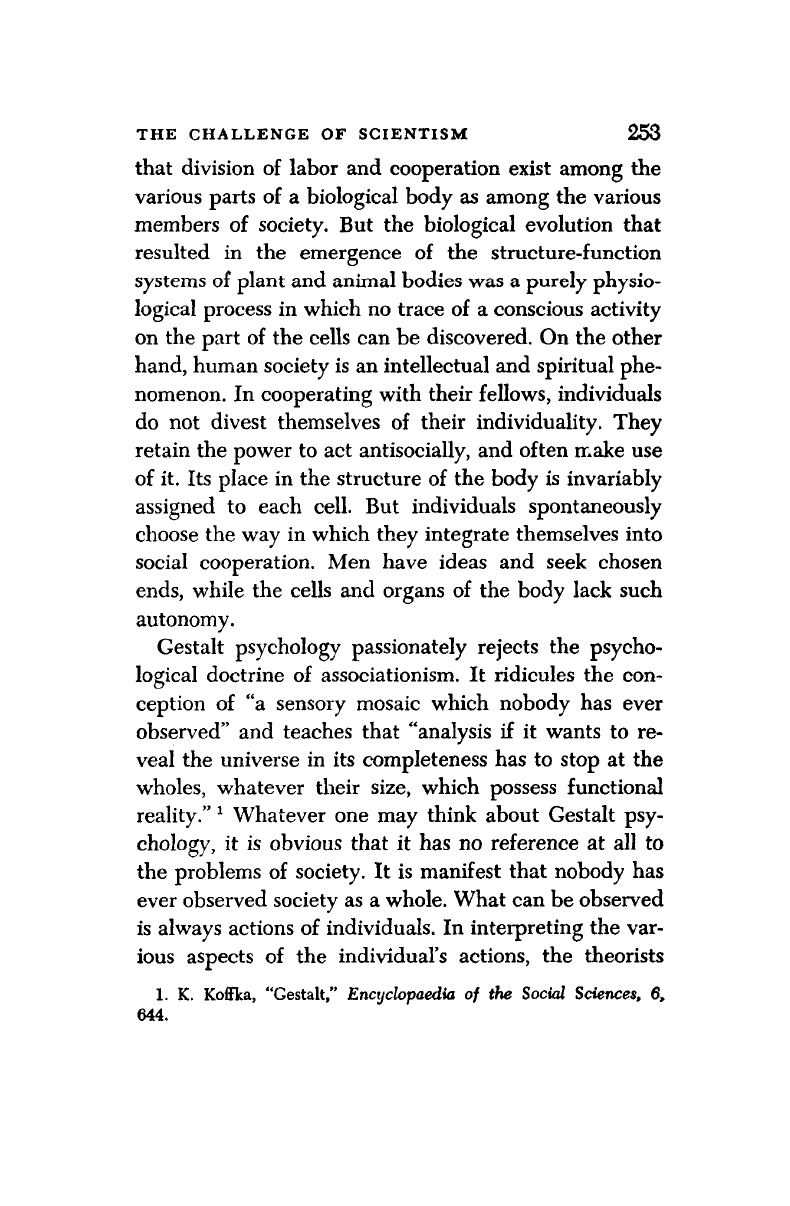
THE CHALLENGE OF SCIENTISM 253
that division
of
labor
and
cooperation exist among
the
various parts
of a
biological body
as
among
the
various
members
of
society.
But the
biological evolution that
resulted
in the
emergence
of the
structure-function
systems
of
plant and animal bodies was
a
purely physio-
logical process
in
which no trace
of a
conscious activity
on the part
of
the cells can
be
discovered. On the other
hand, human society is an intellectual and spiritual phe-
nomenon.
In
cooperating with their fellows, individuals
do
not
divest themselves
of
their individuality. They
retain the power
to act
antisocially,
and
often make
use
of it.
Its
place
in
the structure
of
the body
is
invariably
assigned
to
each cell.
But
individuals spontaneously
choose the way
in
which they integrate themselves into
social cooperation.
Men
have ideas
and
seek chosen
ends,
while
the
cells
and
organs
of the
body lack such
autonomy.
Gestalt psychology passionately rejects
the
psycho-
logical doctrine
of
associationism.
It
ridicules
the con-
ception
of "a
sensory mosaic which nobody
has
ever
observed"
and
teaches that "analysis
if it
wants
to re-
veal
the
universe
in its
completeness has
to
stop
at the
wholes, whatever their size, which possess functional
reality."
1
Whatever
one may
think about Gestalt
psy-
chology,
it is
obvious that
it has no
reference
at all to
the problems
of
society.
It is
manifest that nobody
has
ever observed society as
a
whole. What can be observed
is always actions
of
individuals.
In
interpreting the var-
ious aspects
of the
individual's actions,
the
theorists
1.
K.
Koffka, "Gestalt/' Encyclopaedia
of the
Social Sciences,
6,
644.
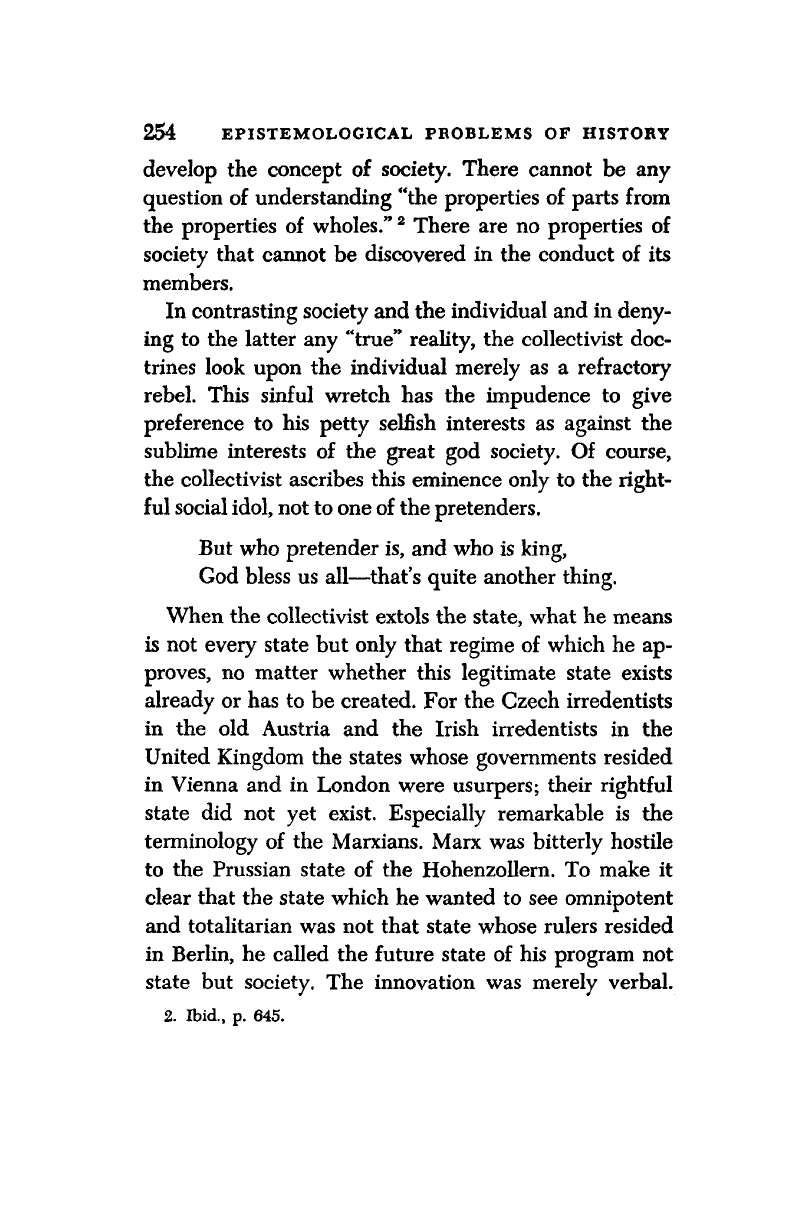
254 EPISTEMOLOGICAL PROBLEMS OF HISTORY
develop the concept of society. There cannot be any
question of understanding "the properties of parts from
the properties of wholes."
2
There are no properties of
society that cannot be discovered in the conduct of its
members.
In contrasting society and the individual and in deny-
ing to the latter any "true" reality, the collectivist doc-
trines look upon the individual merely as a refractory
rebel. This sinful wretch has the impudence to give
preference to his petty selfish interests as against the
sublime interests of the great god society. Of course,
the collectivist ascribes this eminence only to the right-
ful social idol, not to one of the pretenders.
But who pretender is, and who is king,
God bless us all—that's quite another thing.
When the collectivist extols the state, what he means
is not every state but only that regime of which he ap-
proves, no matter whether this legitimate state exists
already or has to be created. For the Czech irredentists
in the old Austria and the Irish irredentists in the
United Kingdom the states whose governments resided
in Vienna and in London were usurpers; their rightful
state did not yet exist. Especially remarkable is the
terminology of the Marxians. Marx was bitterly hostile
to the Prussian state of the Hohenzollern. To make it
clear that the state which he wanted to see omnipotent
and totalitarian was not that state whose rulers resided
in Berlin, he called the future state of his program not
state but society. The innovation was merely verbal.
2.
Ibid., p. 645.
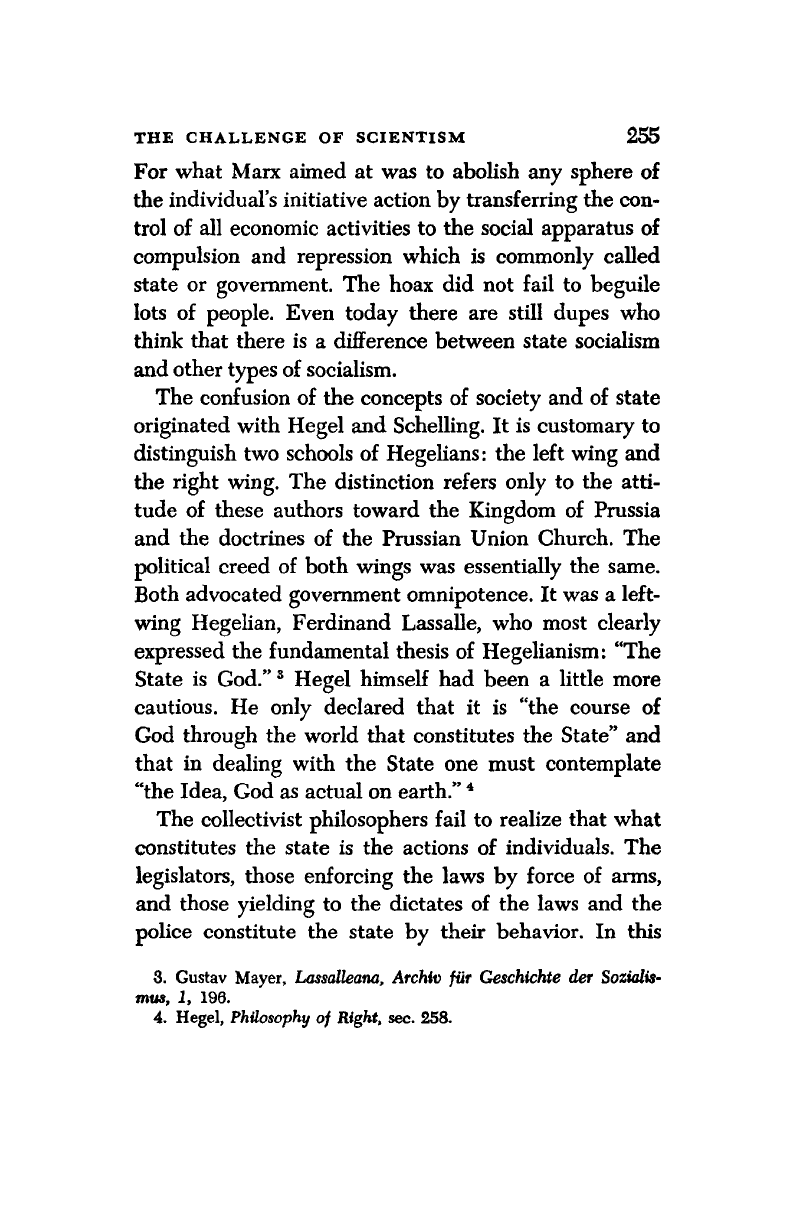
THE CHALLENGE OF SCIENTISM 255
For what Marx aimed at was to abolish any sphere of
the individual's initiative action by transferring the con-
trol of all economic activities to the social apparatus of
compulsion and repression which is commonly called
state or government. The hoax did not fail to beguile
lots of people. Even today there are still dupes who
think that there is a difference between state socialism
and other types of socialism.
The confusion of the concepts of society and of state
originated with Hegel and Schelling. It is customary to
distinguish two schools of Hegelians: the left wing and
the right wing. The distinction refers only to the atti-
tude of these authors toward the Kingdom of Prussia
and the doctrines of the Prussian Union Church. The
political creed of both wings was essentially the same.
Both advocated government omnipotence. It was a left-
wing Hegelian, Ferdinand Lassalle, who most clearly
expressed the fundamental thesis of Hegelianism: "The
State is God/'
3
Hegel himself had been a little more
cautious. He only declared that it is "the course of
God through the world that constitutes the State" and
that in dealing with the State one must contemplate
"the Idea, God as actual on
earth."
4
The collectivist philosophers fail to realize that what
constitutes the state is the actions of individuals. The
legislators, those enforcing the laws by force of arms,
and those yielding to the dictates of the laws and the
police constitute the state by their behavior. In this
3.
Gustav Mayer, Lassalleana, Archie fur Geschichte der Sozialis-
mus, 1, 196.
4.
Hegel, Philosophy of Right, sec. 258.
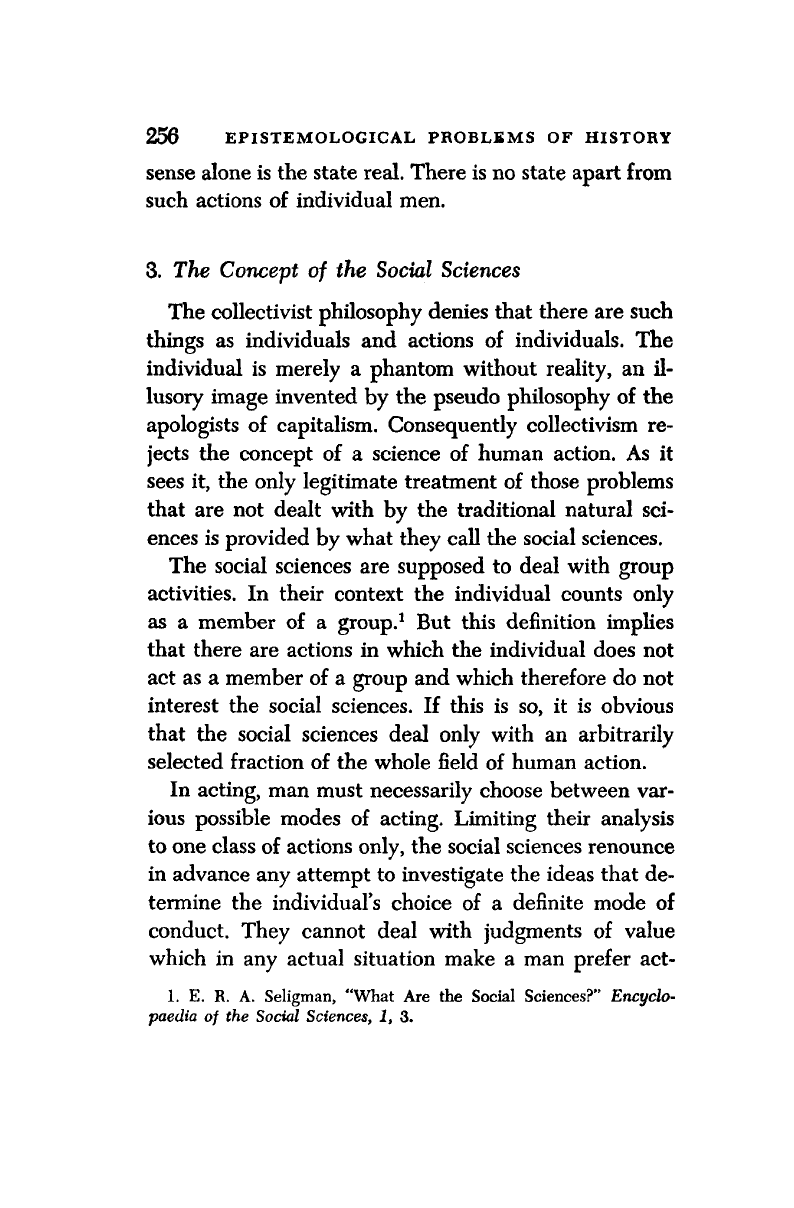
256 EPISTEMOLOGICAL PROBLEMS OF HISTORY
sense alone is the state real. There is no state apart from
such actions of individual men.
3.
The Concept of the Social Sciences
The collectivist philosophy denies that there are such
things as individuals and actions of individuals. The
individual is merely a phantom without reality, an il-
lusory image invented by the pseudo philosophy of the
apologists of capitalism. Consequently collectivism re-
jects the concept of a science of human action. As it
sees it, the only legitimate treatment of those problems
that are not dealt with by the traditional natural sci-
ences is provided by what they call the social sciences.
The social sciences are supposed to deal with group
activities. In their context the individual counts only
as a member of a group.
1
But this definition implies
that there are actions in which the individual does not
act as a member of a group and which therefore do not
interest the social sciences. If this is so, it is obvious
that the social sciences deal only with an arbitrarily
selected fraction of the whole field of human action.
In acting, man must necessarily choose between var-
ious possible modes of acting. Limiting their analysis
to one class of actions only, the social sciences renounce
in advance any attempt to investigate the ideas that de-
termine the individual's choice of a definite mode of
conduct. They cannot deal with judgments of value
which in any actual situation make a man prefer act-
1.
E. R. A. Seligman, "What Are the Social Sciences?" Encyclo-
paedia of the Social Sciences, 1, 3.
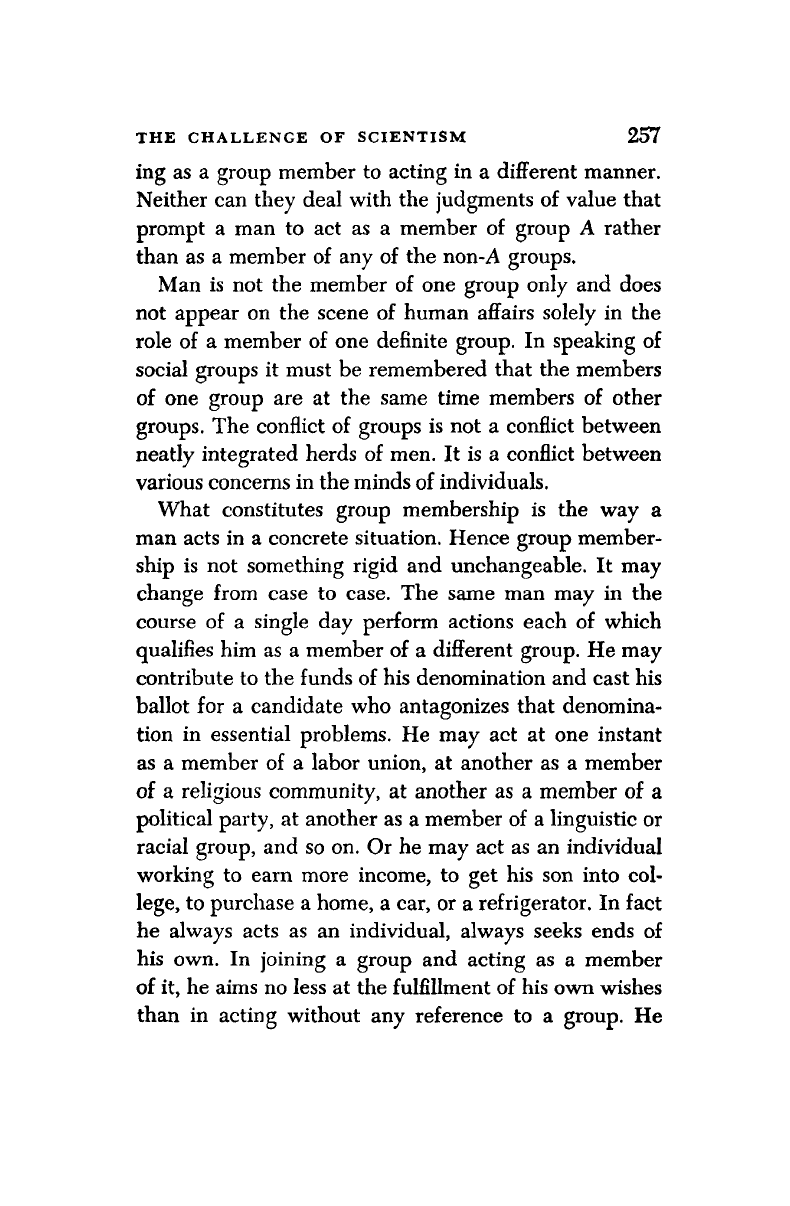
THE CHALLENGE OF SCIENTISM 257
ing as a group member to acting in a different manner.
Neither can they deal with the judgments of value that
prompt a man to act as a member of group A rather
than as a member of any of the non-A groups.
Man is not the member of one group only and does
not appear on the scene of human affairs solely in the
role of a member of one definite group. In speaking of
social groups it must be remembered that the members
of one group are at the same time members of other
groups. The conflict of groups is not a conflict between
neatly integrated herds of men. It is a conflict between
various concerns in the minds of individuals.
What constitutes group membership is the way a
man acts in a concrete situation. Hence group member-
ship is not something rigid and unchangeable. It may
change from case to case. The same man may in the
course of a single day perform actions each of which
qualifies him as a member of a different group. He may
contribute to the funds of his denomination and cast his
ballot for a candidate who antagonizes that denomina-
tion in essential problems. He may act at one instant
as a member of a labor union, at another as a member
of a religious community, at another as a member of a
political party, at another as a member of a linguistic or
racial group, and so on. Or he may act as an individual
working to earn more income, to get his son into col-
lege,
to purchase a home, a car, or a refrigerator. In fact
he always acts as an individual, always seeks ends of
his own. In joining a group and acting as a member
of it, he aims no less at the fulfillment of his own wishes
than in acting without any reference to a group. He
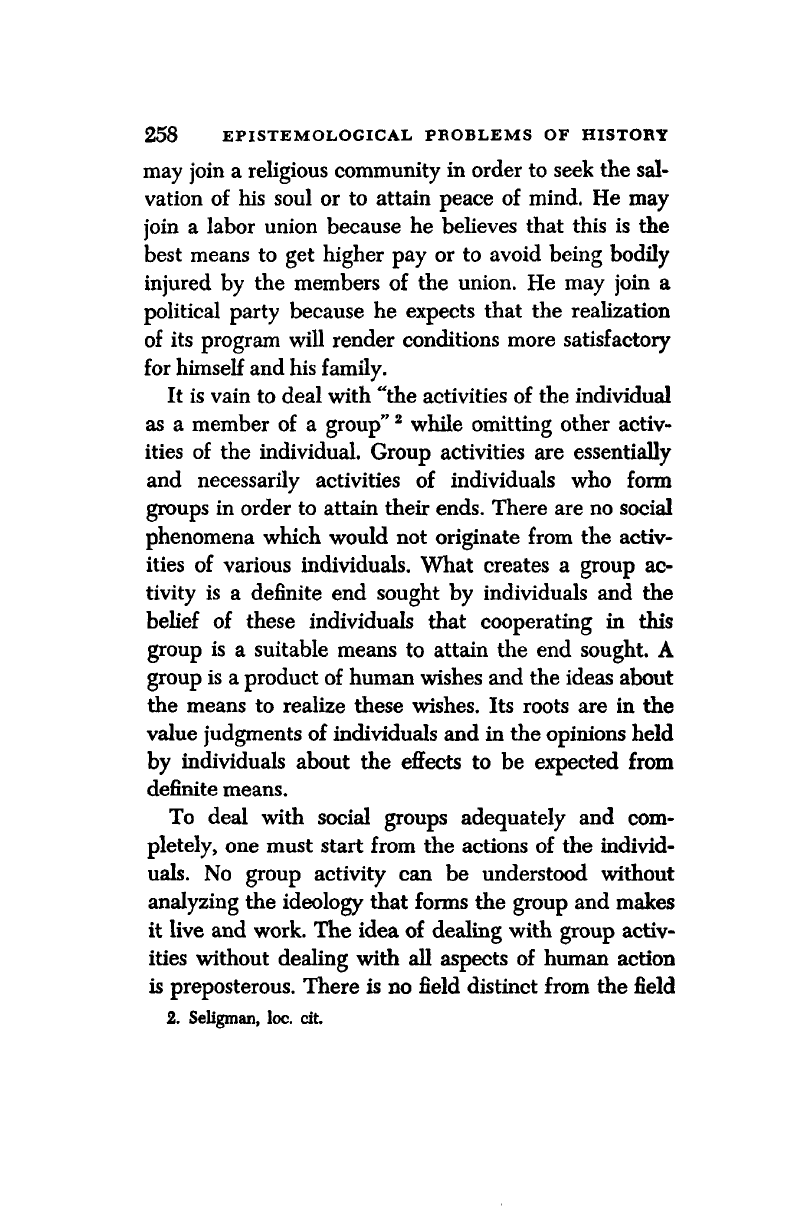
258 EPISTEMOLOGICAL PROBLEMS OF HISTORY
may join a religious community in order to seek the sal-
vation of his soul or to attain peace of mind. He may
join a labor union because he believes that this is the
best means to get higher pay or to avoid being bodily
injured by the members of the union. He may join a
political party because he expects that the realization
of its program will render conditions more satisfactory
for himself and his family.
It is vain to deal with "the activities of the individual
as a member of a
group"
2
while omitting other activ-
ities of the individual. Group activities are essentially
and necessarily activities of individuals who form
groups in order to attain their ends. There are no social
phenomena which would not originate from the activ-
ities of various individuals. What creates a group ac-
tivity is a definite end sought by individuals and the
belief of these individuals that cooperating in this
group is a suitable means to attain the end sought. A
group is a product of human wishes and the ideas about
the means to realize these wishes. Its roots are in the
value judgments of individuals and in the opinions held
by individuals about the effects to be expected from
definite means.
To deal with social groups adequately and com-
pletely, one must start from the actions of the individ-
uals.
No group activity can be understood without
analyzing the ideology that forms the group and makes
it live and work. The idea of dealing with group activ-
ities without dealing with all aspects of human action
is preposterous. There is no field distinct from the field
2.
Seligman, loc. cit.
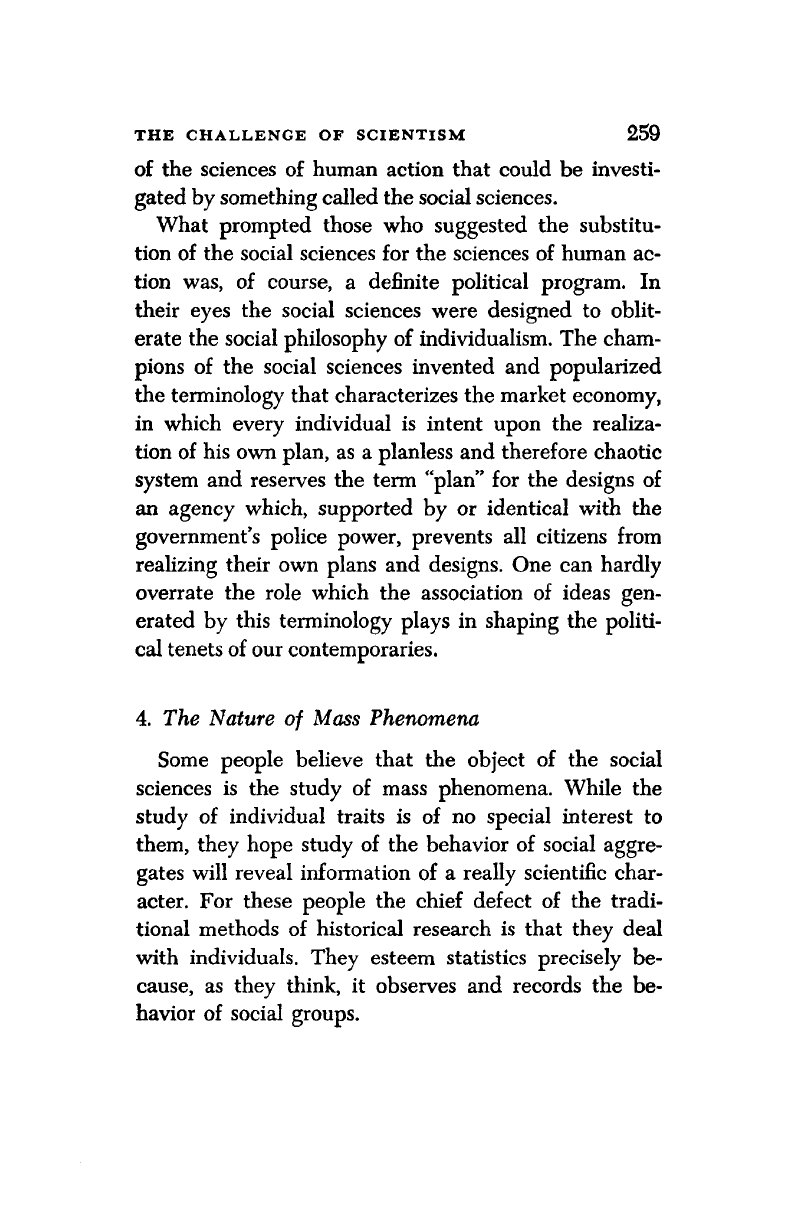
THE CHALLENGE OF SCIENTISM 259
of the sciences of human action that could be investi-
gated by something called the social sciences.
What prompted those who suggested the substitu-
tion of the social sciences for the sciences of human ac-
tion was, of course, a definite political program. In
their eyes the social sciences were designed to oblit-
erate the social philosophy of individualism. The cham-
pions of the social sciences invented and popularized
the terminology that characterizes the market economy,
in which every individual is intent upon the realiza-
tion of his own plan, as a planless and therefore chaotic
system and reserves the term "plan" for the designs of
an agency which, supported by or identical with the
government's police power, prevents all citizens from
realizing their own plans and designs. One can hardly
overrate the role which the association of ideas gen-
erated by this terminology plays in shaping the politi-
cal tenets of our contemporaries.
4.
The Nature of Mass Phenomena
Some people believe that the object of the social
sciences is the study of mass phenomena. While the
study of individual traits is of no special interest to
them, they hope study of the behavior of social aggre-
gates will reveal information of a really scientific char-
acter. For these people the chief defect of the tradi-
tional methods of historical research is that they deal
with individuals. They esteem statistics precisely be-
cause, as they think, it observes and records the be-
havior of social groups.
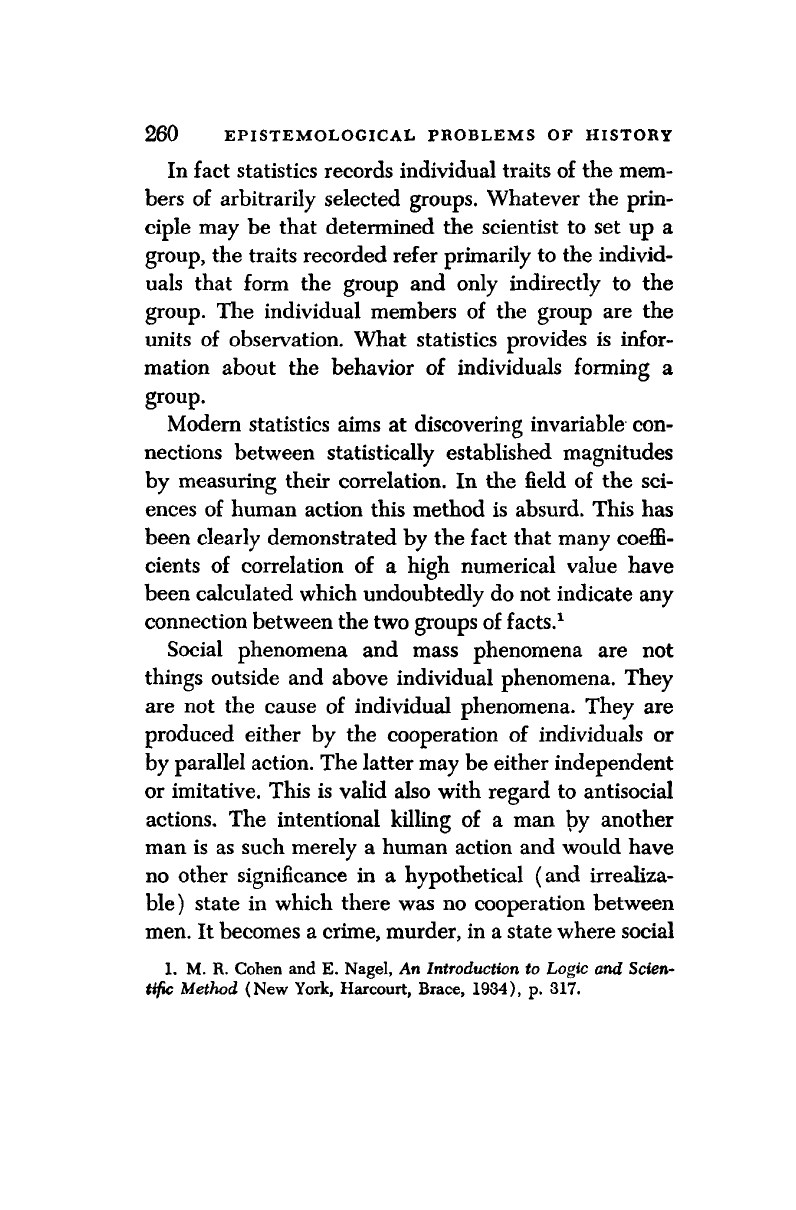
260 EPISTEMOLOGICAL PROBLEMS OF HISTORY
In fact statistics records individual traits of the mem-
bers of arbitrarily selected groups. Whatever the prin-
ciple may be that determined the scientist to set up a
group,
the traits recorded refer primarily to the individ-
uals that form the group and only indirectly to the
group.
The individual members of the group are the
units of observation. What statistics provides is infor-
mation about the behavior of individuals forming a
group.
Modern statistics aims at discovering invariable con-
nections between statistically established magnitudes
by measuring their correlation. In the field of the sci-
ences of human action this method is absurd. This has
been clearly demonstrated by the fact that many coeffi-
cients of correlation of a high numerical value have
been calculated which undoubtedly do not indicate any
connection between the two groups of facts.
1
Social phenomena and mass phenomena are not
things outside and above individual phenomena. They
are not the cause of individual phenomena. They are
produced either by the cooperation of individuals or
by parallel action. The latter may be either independent
or imitative. This is valid also with regard to antisocial
actions. The intentional killing of a man by another
man is as such merely a human action and would have
no other significance in a hypothetical (and irrealiza-
ble) state in which there was no cooperation between
men.
It becomes a crime, murder, in a state where social
1.
M. R. Cohen and E. Nagel, An Introduction to Logic and Scien-
tific Method (New York, Harcourt, Brace, 1934), p. 317.
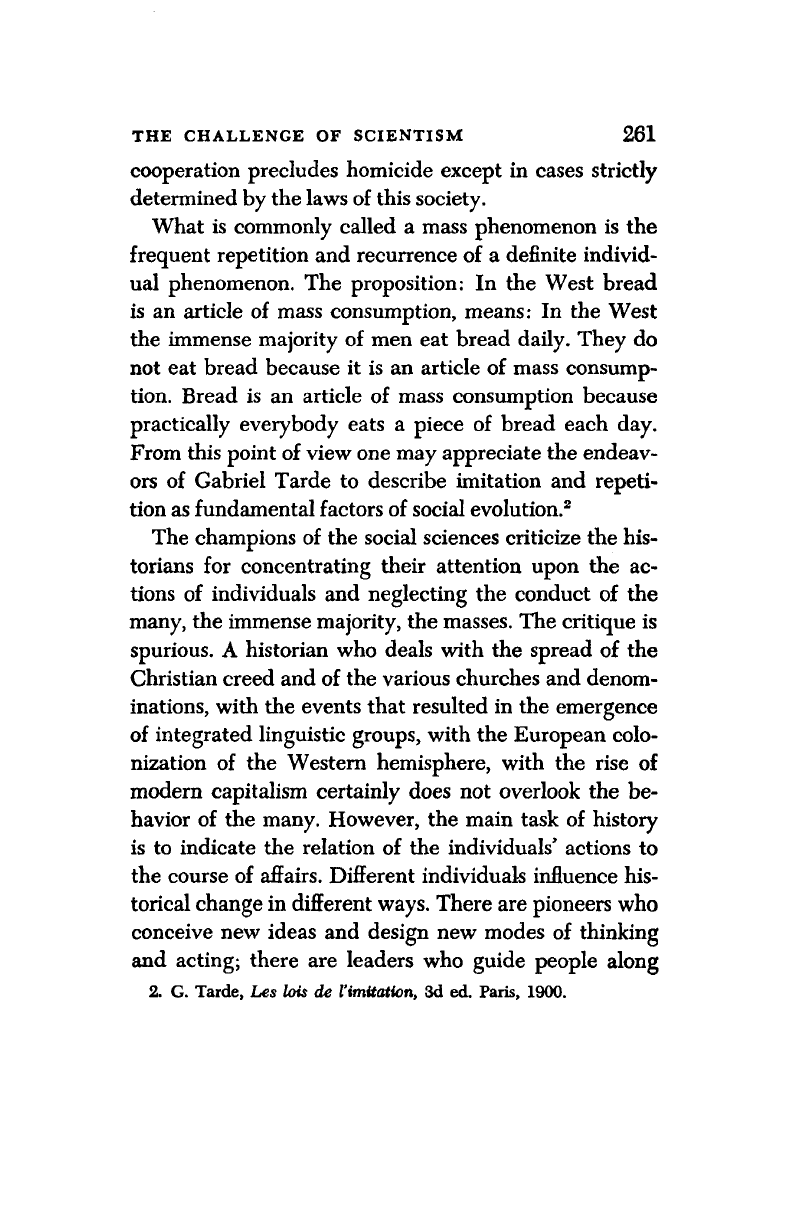
THE CHALLENGE OF SCIENTISM 261
cooperation precludes homicide except in cases strictly
determined by the laws of this society.
What is commonly called a mass phenomenon is the
frequent repetition and recurrence of a definite individ-
ual phenomenon. The proposition: In the West bread
is an article of mass consumption, means: In the West
the immense majority of men eat bread daily. They do
not eat bread because it is an article of mass consump-
tion.
Bread is an article of mass consumption because
practically everybody eats a piece of bread each day.
From this point of view one may appreciate the endeav-
ors of Gabriel Tarde to describe imitation and repeti-
tion as fundamental factors of social evolution.
2
The champions of the social sciences criticize the his-
torians for concentrating their attention upon the ac-
tions of individuals and neglecting the conduct of the
many, the immense majority, the masses. The critique is
spurious. A historian who deals with the spread of the
Christian creed and of the various churches and denom-
inations, with the events that resulted in the emergence
of integrated linguistic groups, with the European colo-
nization of the Western hemisphere, with the rise of
modern capitalism certainly does not overlook the be-
havior of the many. However, the main task of history
is to indicate the relation of the individuals* actions to
the course of affairs. Different individuals influence his-
torical change in different ways. There are pioneers who
conceive new ideas and design new modes of thinking
and acting; there are leaders who guide people along
2.
G. Tarde, Les lois de limitation, 3d ed. Paris, 1900.
